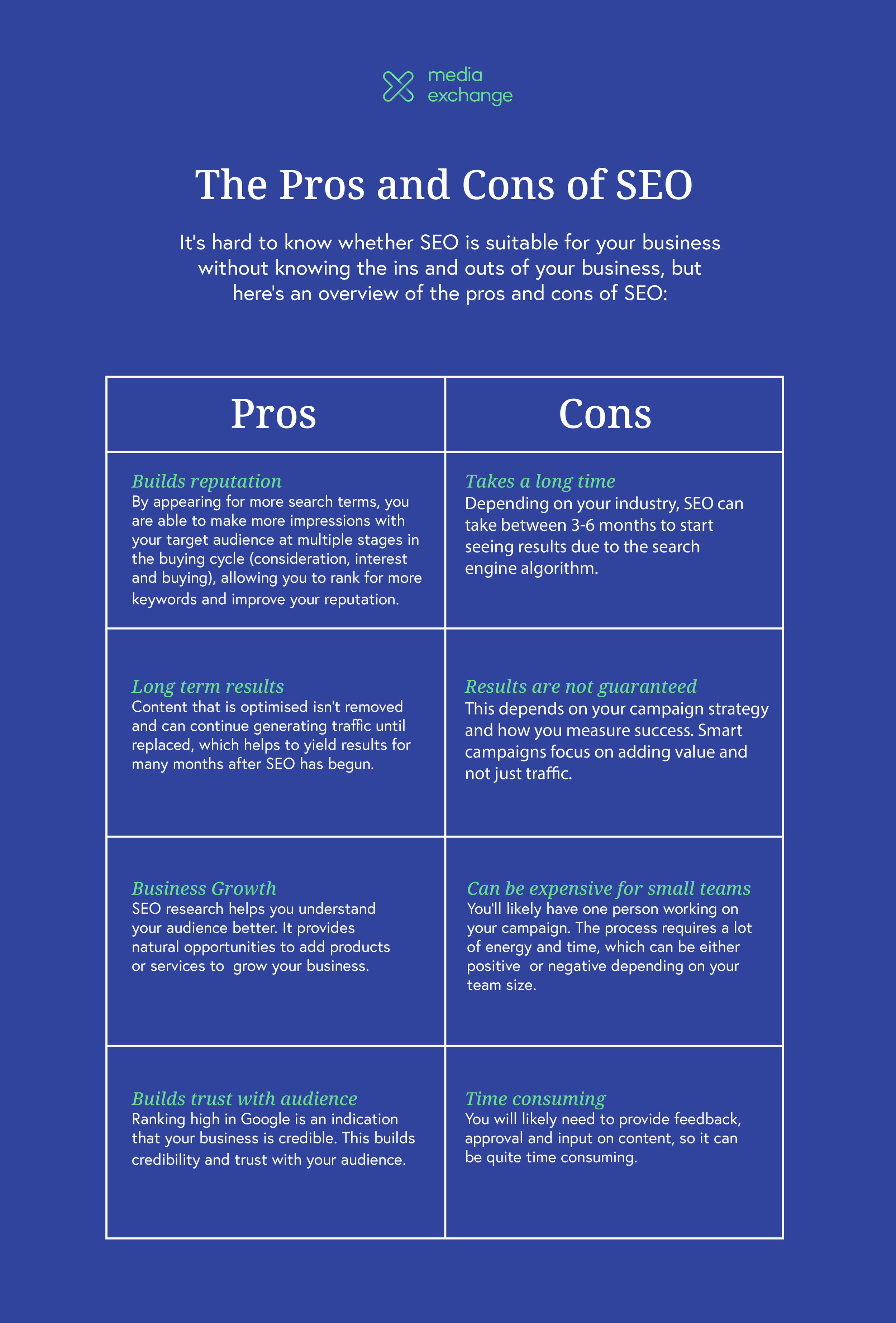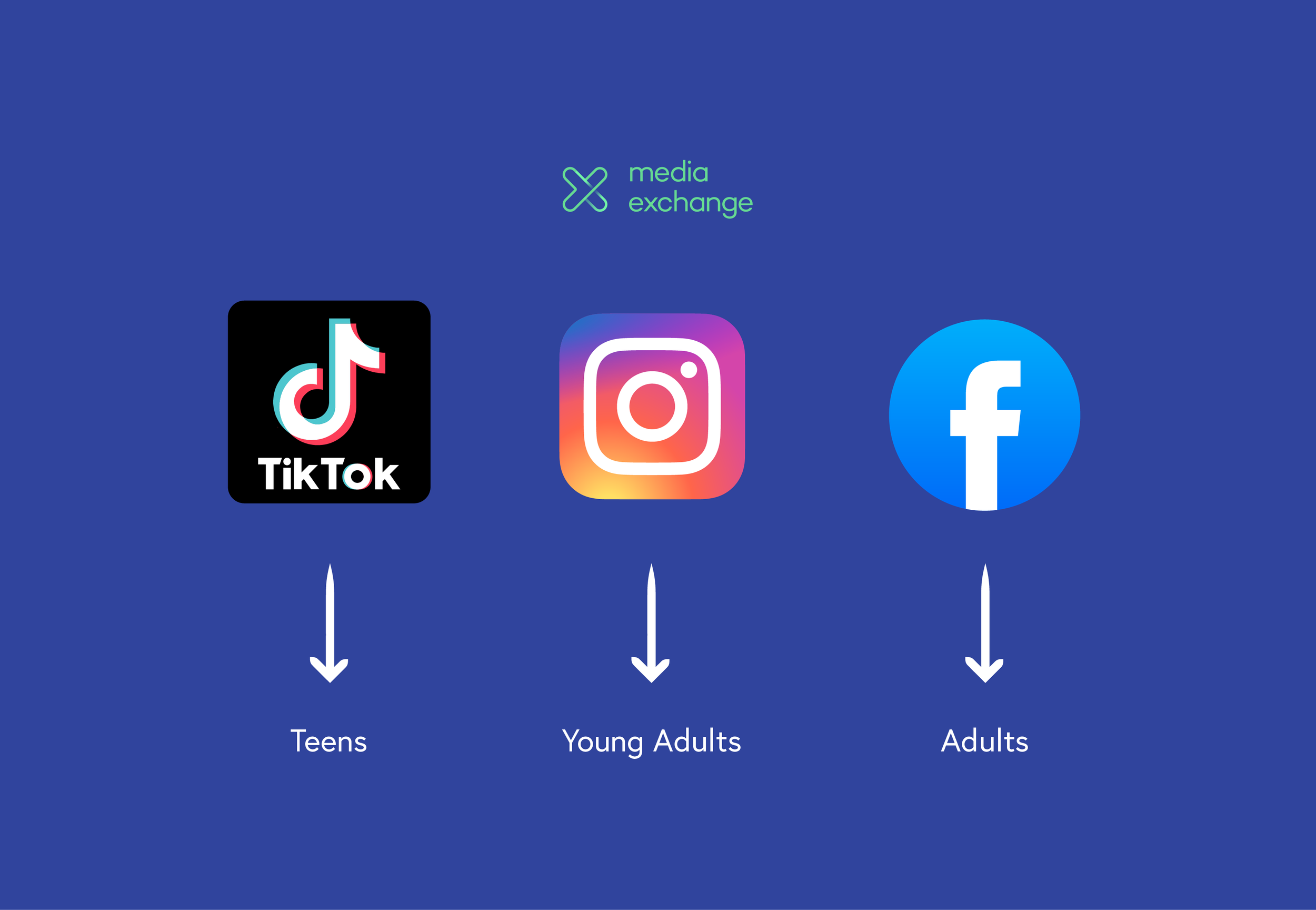If you’re reading this article, chances are you own a small business with an even smaller marketing budget, strategising how to use it best. We know that you have worked hard to get where you are and are looking for affordable ways to grow. So now, the pressing question arises… is search engine optimisation (SEO) a worthwhile investment for your business?
Depending on your specific goals, SEO is effective in different ways. For example, it can lead to positive long term relationships and considerable business growth, but at the same time, it can also be expensive and take a long time to see results. SEO is known for creating excellent results when done well, but that doesn’t always mean that it’s a suitable investment for all small businesses.
What is SEO?
Simply, search engine optimisation (SEO) is the process of improving your website’s visibility on search engines.
When someone searches for something on a search engine like Google, SEO helps particular websites appear higher than others. To improve the site ranking, SEO specialists use various factors such as keyword optimisation, backlinks, domain authority, and content relevancy to improve the position of a page.
SEO involves three main pillars: technical, content and link-building. Each pillar impacts how easily your business appears in search results.
- Technical: the elements that communicate your website directly with search engines. This includes things like title and meta descriptions, meta tags, internal links and other elements that improve its chances of being added to the search engine index.
- Content: everything on your website that can be read, seen, or interacted with by users. SEO content includes headings, images, copywriting and more. These aspects get added to pages such as the category, sub-category and blogs. All these aspects should focus on adding value to users.
- Link Building: the process of generating links to improve your sites authority in search engines. The higher the number of quality backlinks a page secures, the greater its potential is to rank for competitive search terms.
If you need a more detailed explanation, you can find more information on the SEO pillars here.
The pros and cons of SEO
It’s hard to know whether SEO is suitable for your business without knowing the ins and outs of your business, but here’s an overview of the pros and cons of SEO:

Getting started with SEO
After carefully looking through the pros and cons, you can determine if SEO is a suitable investment for your business. If you decide that it is, it’s crucial to clearly define your goals and align them with your marketing budget. Are you trying to generate leads or build your brand?
SEO can help you achieve both depending on the price you’re willing to pay. It is an incredibly affordable brand building channel that can be measured more accurately than other channels, like organic social media and radio advertising. So if you are trying to make more impressions and grow your brand without busting the bank, then SEO might be a more suitable investment.
Who are you selling to?
In SEO you must know your audience. We like to ask our clients to list their target audiences and their interests. From there, we then use that information to research the audience further to try to find out as much as we can about their behavior online. We use this information to figure out which channel is most likely to reach them and make the best impression.

Once you’ve qualified who you are selling to and have determined which channel would be best to reach them, you will be able to segment and target the right individuals that would benefit from your product or service.
If you are having trouble defining your audience, you can qualify them further by adding fields users can select, like which source they came from, to get a better idea of who your current and ideal customers would be.
How to implement SEO
When your marketing budget is set, your target audience is defined and your business goals are aligned, this is where SEO campaigns come into play.
Step 1
The first step of an SEO campaign to assess the technical health of the website through an SEO audit. Some factors assessed are: site speed, url structures, internal links, site architecture, headings, duplicate content and more. All these aspects impact how easy it is for search engines to add your site to its index. If your site is not in its index, it cannot show in search results.
Step 2
The next step is understanding your share of voice, which is a percentage of traffic you receive for relevant search terms compared to your competitors. Knowing what your share of voice is helps
Step 3
After setting your “SMART” goals and learning your share of voice, the next step is to perform keyword visibility and research to see what people are looking for on search engines. Long-tail keywords, typically 3-5 word phrases, can enhance keyword research by revealing lower competition and improved ranking opportunities.
Step 4
Once the past three steps are complete, it’s time for you to build a strong link profile. This means adding internal links on the site to other category pages or linking content to blogs or social media platforms. Another way to do it is through backlinking, which is where natural links from reputable websites are linked to your website. Having these incorporated helps to measure expertise and authority to website users. With that, the SEO campaign road map is developed.
Content Strategies in SEO
It’s important to also include a content strategy, as you will need intriguing yet informative messages that will resonate with your target audience.
The objective of a content strategy is to meet your audience at every stage of the buying cycle, where you pull users’ interest in, engage with them, have them consider your product or service and ultimately, get them to buy.
We believe that the content strategy is one of the most important aspects of an SEO campaign. A good content strategy will fit comfortably into your overall business objectives and should provide insight whilst aligning with other marketing channels.
Is SEO right for your small business?
So now after taking a look at the pros and cons and seeing the step by step SEO process, you can decide if SEO is the right move for your business. Just remember, SEO is not a one-time task but a continuous process that involves monitoring, updating, and optimising your content and strategy over time. With patience and persistence, SEO can significantly enhance your online presence, drive targeted traffic and ultimately contribute to your business’s growth and success.

